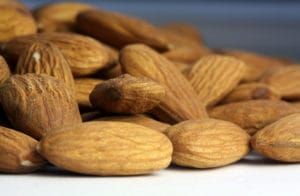Cornucopia’s Take: Since 2007 the USDA mandate for pasteurized raw almonds has meant that California-grown raw almonds are no longer truly raw. They must be treated with a toxic fumigant classified as a possible carcinogen (propylene oxide) or heated with steam. Newly introduced radio frequency technology may be a game-changer for growers and consumers.
Organic raw almond producer first to use new pasteurization process
Sustainable Food News
 |
California’s 2016 almond crop forecast to yield 2 bil’ lbs.
The Almond Board of California (ABC) has approved a non-roasting bulk pasteurization process for raw almonds at Sran Family Orchards, a producer of organic and conventional almonds in Kerman, Calif.
The ABC’s Technical Expert Review Panel (TERP) has certified RF Biocidics’ APEX 85 chemical-free, pasteurization system that uses radio frequency technology to significantly reduce the level of harmful pathogens in raw almonds.
“This technology is truly a game-changer for the almond industry and we are proud to be the only processor in the United States with this validation for natural almonds,” said Lakhy Sran, partner at Sran Family Orchards, which is certified organic by Santa Cruz, Calif.-based CCOF.
California is the world’s largest producer of almonds with this year’s crop forecasted to surpass two billion pounds for the first time since 2013. U.S. almond consumption has spiked 33 percent in the past five years.
Almond pasteurization is required by law in North America after two outbreaks of salmonella bacteria poisoning that were traced to almonds in 2001 and 2004.
“Consumer demand and the Food Safety Modernization Act are guiding the food industry towards organic, chemical-free processes, so APEX 85’s TERP certification is perfectly aligned with the market’s needs,” said Vincent Chun, board member of Sacramento, Calif.-based RF Biocidics, and vice president of Allied Minds (LSE: ALM), its parent company. “We believe our radio-frequency technology will be a compelling alternative for California’s 6,800 almond growers because it has minimal change to the taste and texture of the nut.”
Story courtesy of Sustainable Food News, an authoritative daily industry newsletter. For information on subscribing:http://www.sustainablefoodnews.com/register.php

